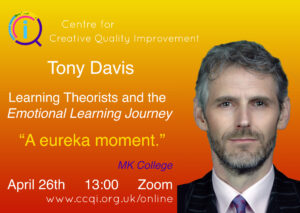The no. 1 challenge teachers face right now

What’s the no. 1 challenge teachers from across the sector are reporting right now? It isn’t English or maths, or even financial hardship; though I don’t wish to diminish the enormous challenge of any of these. It’s wellbeing. Or could I be a bit provocative – is it the helplessness teachers feel when they are rightly stretching and challenging their learners… who then play the ‘mental health’ card? This is a minefield, I know.
I’m not for one moment suggesting that some learners are not genuine, but now learners know the power of ‘playing this card’ in place of developing resilience, I can’t help but think too many are crying wolf. This is very dangerous, as it masks the genuine cases. All of this said, whether genuine or not, presents us with a great opportunity; and it’s the subject of this Wednesday’s open, online session: Learning Theorists and the Emotional Learning Journey. More details here: www.ccqi.org.uk/learningtheory. Please don’t be put off by the title, this session isn’t about the history of Theorists made thorny by impenetrable language and concepts – it’s about a toolkit to deal with our wellbeing challenges.
You see, I feel we’ve been planning lessons from the wrong starting point for years. (By the way, a little later on I’d like to offer an alternative to the phrase ‘lesson planning’, which I think is at the heart of the problem.) What many teachers do is to look at the assessment objectives of the qualification, then lay these out on the scheme of work so that they can be sure they’ll cover everything in the allotted time. This then dictates the content for each lesson, and a deliver plan is then written.
Now let me digress for a moment to give a single illustration of a planning issue that permeates the whole academic year. Here’s a question I continually ask teachers: ‘At what point in the year is learner-motivation at its lowest?’ The vast majority say it’s the first week of the January term. I then ask teachers to plot on a ‘thin’ scheme of work the ‘star’ weeks in the year – the ones learners are most looking forward to for a number of weeks. Are you ahead of me for the punchline? Too many teachers don’t have any of these ‘star’ weeks, and hardly any have the most exciting sessions in the first week of January.
This means teachers know the emotional low point, but do nothing to mitigate it. This has to be poor curriculum design. Simply put (for this illustration at least), if January was the most exciting month of the year, the whole education experience would be notched up. But remember, this is just one illustration.
So now imagine plotting the emotional learning journey across the year, before designing your scheme of work..
But Wednesday’s session is about much more than this. It’s about looking at the emotional challenges you have in the class you’re about to teach and choosing the right pedagogy approach to overcome the emotional challenges so that your content can work its magic. We’ll be looking at 50 different teaching strategies drawn from the four main learning theories and seeing which are the most suitable to either address the emotional challenges that are hampering learning or to produce the positive, conducive emotional learning states that make life easy for us all. It’s a sweetshop of fabulous teaching approaches.
Do please join us if you can and tag any of your colleagues who might be interested, and/or share with your own networks if you’re able. Wednesday 26 April, 1pm www.ccqi.org.uk/learningtheory.
Here’s what other delegates have said about this session:
- ‘This should be a national programme.’ Grimsby Institute
- ‘I love that loads of the theories can be applied easily. I am going to try to use a different card every week.’ Lakes College
- ‘A eureka moment.’ MK College
- ‘Brilliant insight into a variety of learning theories and the emotional learning journey. Always incredibly informative.’ Sysco
By the way, I mentioned I’d like to commend to you for consideration an alternative to the phrase ‘lesson planning’. Try replacing it with: ‘designing learning experiences’ and see if it starts to make a difference to how you think; it certainly does with me.




Comments
No comments yet